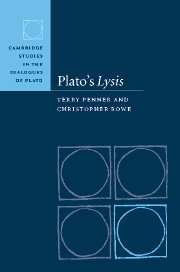Book contents
- Frontmatter
- Contents
- Preface
- PART I AN ANALYSIS OF THE LYSIS
- 1 203a1–207b7: the cast assembles, and the main conversation is set up
- 2 207b8–210d8 (Socrates and Lysis): do Lysis' parents really love him?
- 3 210e1–213c9: Socrates and Menexenus – how does one get a friend?
- 4 213d1–216b9: Socrates and Lysis again, then Menexenus – poets and cosmologists on what is friend of what (like of like; or opposite of opposite?)
- 5 216c1–221d6: what it is that loves, what it really loves, and why
- 6 221d6–222b2: the main argument reaches its conclusion
- 7 222b3–e7: some further questions from Socrates about the argument, leading to (apparent) impasse
- 8 223a1–b8: the dialogue ends – people will say that Socrates and the boys think they are friends, but that they haven't been able to discover what ‘the friend’ is
- 9 203a1–207b7 revisited
- PART II THE THEORY OF THE LYSIS
- Epilogue
- Translation of the Lysis
- Bibliography
- Index of names
- Index of subjects
4 - 213d1–216b9: Socrates and Lysis again, then Menexenus – poets and cosmologists on what is friend of what (like of like; or opposite of opposite?)
Published online by Cambridge University Press: 22 September 2009
- Frontmatter
- Contents
- Preface
- PART I AN ANALYSIS OF THE LYSIS
- 1 203a1–207b7: the cast assembles, and the main conversation is set up
- 2 207b8–210d8 (Socrates and Lysis): do Lysis' parents really love him?
- 3 210e1–213c9: Socrates and Menexenus – how does one get a friend?
- 4 213d1–216b9: Socrates and Lysis again, then Menexenus – poets and cosmologists on what is friend of what (like of like; or opposite of opposite?)
- 5 216c1–221d6: what it is that loves, what it really loves, and why
- 6 221d6–222b2: the main argument reaches its conclusion
- 7 222b3–e7: some further questions from Socrates about the argument, leading to (apparent) impasse
- 8 223a1–b8: the dialogue ends – people will say that Socrates and the boys think they are friends, but that they haven't been able to discover what ‘the friend’ is
- 9 203a1–207b7 revisited
- PART II THE THEORY OF THE LYSIS
- Epilogue
- Translation of the Lysis
- Bibliography
- Index of names
- Index of subjects
Summary
[Preliminary note:
We found the part of the Lysis covered in this chapter, together with that covered in chapter 3, the hardest in the whole dialogue. In the case of the material of the present chapter, our difficulties were increased by the cavalier treatment Socrates appears to hand out to the poets and the cosmologists whose views he is supposedly canvassing. The reader may well feel that Socrates is not in fact taking their views seriously at all, but rather using them as an excuse to drag in a bunch of claims he wants to discuss in any case: that the y in ‘x loves y’ can only be the good; that the x in ‘x loves y’ cannot be either the good or the bad, but is rather the neither-good-nor-bad; and that the object of love is a certain self-sufficient, teleological and hierarchical good that is the ultimate object of love for all desirers – all of whom stand in need of something, namely, that self-sufficient ultimate good. (It will turn out that the self-sufficiency involved is of a special, particular kind: a maximal, or practicable self-sufficiency. But that is to anticipate a specific issue that will bulk large in the present chapter.)
An obvious parallel the reader might adduce, for the whole style of the passage, is Socrates' treatment of Simonides at Protagoras 338e6–347a5: the passage which – extraordinarily, one might say, even mischievously?
- Type
- Chapter
- Information
- Plato's Lysis , pp. 64 - 98Publisher: Cambridge University PressPrint publication year: 2005

